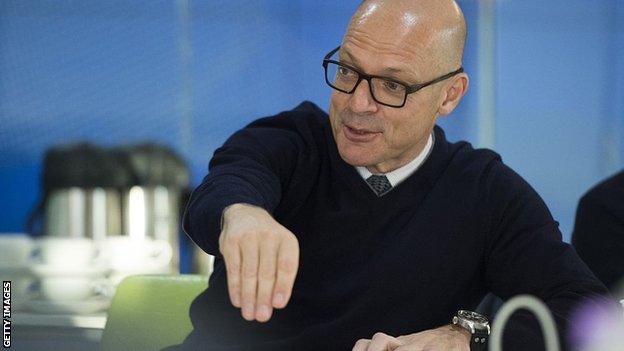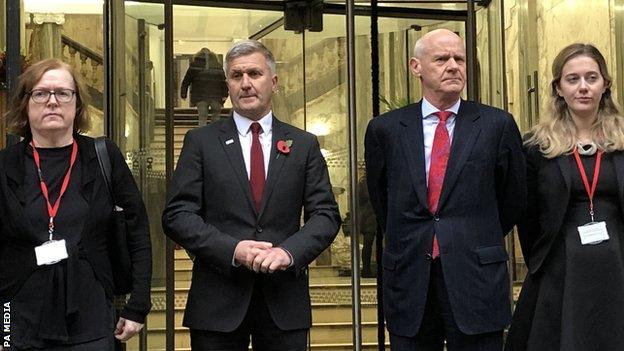Dr Richard Freeman: Ex-British Cycling and Team Sky chief doctor guilty
- Published
Watch BBC sports editor Dan Roan's report on ex-British Cycling doctor found guilty of ordering banned testosterone
Ex-British Cycling and Team Sky chief doctor Richard Freeman has been found guilty of ordering banned testosterone in 2011 "knowing or believing" it was to help dope an unnamed rider.
A medical tribunal ruled Freeman ordered Testogel with the knowledge "it was to be administered to an athlete to improve their athletic performance".
It added that Freeman's actions were "incapable of innocent explanation".
British Cycling said the finding was "extremely disturbing".
Freeman had previously admitted 18 of 22 charges against him but denied the central charge about the purpose of the Testogel order.
The hearing will resume on 17 March, when the tribunal will consider if Freeman's "fitness to practise is impaired".
During the tribunal, which has lasted for more than two years, Freeman said he was bullied into ordering the drug by former British Cycling and Team Sky performance director Shane Sutton to treat his erectile dysfunction.
Sutton denied those claims, and claimed Freeman was lying. The tribunal ruled Freeman's claims were an "elaborate falsehood".
It ruled the motive for Freeman's actions was to "conceal his conduct". Only one charge was found not proved - that he knew the Testogel was not "clinically indicated" for Sutton.
In the tribunal's written reasons, it said: "In May 2011, Dr Freeman, the team doctor for a team of elite cyclists and a member of the anti-doping working group, ordered a doping 'drug of choice' for that sport.
"Upon its arrival he was dishonest about why it had been sent, removed it from the velodrome, and it was never seen again. The tribunal found that Dr Freeman has been dishonest in its regard ever since."

Sutton has defended his former boss Brailsford
Speaking to BBC Sport's Laura Scott after the ruling, Sutton said he was "saddened" by the verdict and maintained British Cycling "ran the cleanest programme in the world".
"I just think it casts a shadow over great athletes," said Sutton, adding it was "absolutely ludicrous" people were "calling for the head" of Sir Dave Brailsford, general manager of Team Sky (now Team Ineos) and former performance director of British Cycling.
"Unfortunately I was a scapegoat on the journey," said Sutton. "Now it's over I can sit there and feel vindicated.
"But its scars I will carry for the rest of my life, that's for sure, because it's been one hell of a two years.
"I would have no problem standing up and saying if I had a medical condition and it was for me. I would not want to put Dr Freeman and everybody else through this if I had a medical problem. I'd be one of millions of people around the world with that condition that needed treating."
In an earlier statement, he said: "I'd like to stress that neither I nor Sir Dave Brailsford knew about the testosterone order. But I think it's important to find out who the doctor ordered it for."
Team Ineos said Freeman "fell short of the ethical standards required of him as a doctor and acted dishonestly".
In a statement, it added: "However, the team does not believe that any athlete ever used or sought to use Testogel or any other performance-enhancing substance.
"No evidence has been provided that this ever happened or that there has been any wrongdoing by any athlete at any point.
"We will continue to give our full support and co-operation to UK Anti-Doping, as we have done throughout this process, as they continue to investigate his conduct."
British Cycling chief executive Brian Facer said: "The wider actions of Dr Freeman described in the tribunal fall a mile short of the standards we expect."
He added substantial changes had been made to medical services and governance at the body since Freeman's suspension four years ago.
World Anti-Doping said it noted the verdict "with concern" and would support authorities "to ensure that all possible lines of enquiry are exhausted".
UK Sport said the case "must send a clear message to staff, athletes and sports fans that doping will not be tolerated" while the British Olympic Association pledged to support the "pursuit of the truth."

Mary O'Rourke (left) defended Dr Richard Freeman (second left) at the medical tribunal in Manchester
'The verdict they were dreading' - analysis
BBC sports editor Dan Roan
This is the verdict that many involved in British Cycling and Team Sky were dreading.
Dr Freeman was the top medic at both organisations during a period of unprecedented success on both the road and track.
For years he worked closely with some of British sport's biggest names - from Sir Bradley Wiggins and Sir Dave Brailsford to psychologist Dr Steve Peters.
There has been no suggestion of wrongdoing by any of them connected to this, or any other case.
But for the former chief medic to have been found guilty of ordering a banned substance to help a rider to cheat - a year before London 2012 - is a devastating blow to the reputation of one of the country's most successful and best-funded sports, the driving force behind Team GB's Olympic revival.
It leaves uncomfortable questions; who was the rider? Who else knew? And will Dr Freeman now have more to reveal?
Cycling has tried to move on from this scandal, and previous controversies. The national governing body has brought in reforms, codes of conduct and new leadership.
Team Sky became Team Ineos in what was a much-needed fresh start. But moving on from the past just became much harder and today's news raises more questions about the so-called medal factory.
After an unedifying and drawn-out tribunal featuring a cover-up, a damaged laptop, feuds, and chaotic medical record-keeping, that reputation for excellence lies in tatters.
And just a few months before the Tokyo Games, the timing could not be worse.
What is the background?
Freeman, who was simultaneously employed by British Cycling and Team Sky between 2009 and 2015, resigned from British Cycling in October 2017 because of ill health. He had already left Team Sky.
His medical tribunal began in November 2019 after he was accused by the General Medical Council (GMC) of ordering 30 sachets of Testogel to the National Cycling Centre in Manchester in May 2011, "knowing or believing" the banned drug was intended to boost an athlete's performance.
He admitted 18 of 22 charges against him, including initially lying to try to cover up the order, and misleading a Ukad investigation.
But Freeman denied the remaining four charges, including the accusation he helped to dope a rider, saying he was bullied into ordering the drug by Sutton.
Freeman failed in his bid to have the four remaining charges thrown out, but the tribunal chair said there was a "case to answer for all outstanding matters".
The tribunal was then repeatedly adjourned on medical grounds, with his lawyer Mary O'Rourke QC saying Freeman, who has bipolar disorder, was too unwell to attend.
It eventually resumed in October 2020. Giving evidence for the first time, Freeman said he used "a screwdriver or blunt instrument" to destroy a laptop which may have contained medical data crucial to the investigation for fear that information could be hacked.
He told the tribunal he had secretly taken the package of Testogel home on the night it was delivered to the National Cycling Centre and washed it down the sink.
He later claimed he was unaware of testosterone's performance-enhancing benefits, and insisted the issue of doping had never arisen between himself and former British Cycling medical director Dr Steve Peters.
His cross-examination by GMC QC Simon Jackson lasted for seven weeks.
On 26 November, his tribunal was once again adjourned to resume on 22 January 2021, extending it into a third year.
Freeman then requested a further adjournment so that he could help deliver the Covid-19 mass vaccination programme but his request was denied.
Final submissions were completed at a hearing in February. The verdict had been due on 2 March, but was pushed back to 12 March after the Medical Practitioners Tribunal Service said further time was required.
Other controversies
Freeman has been at the centre of a number of controversies.
In 2017, Ukad closed a 14-month investigation into a 'mystery' medical package delivered for Sir Bradley Wiggins at the Criterium du Dauphine in 2011, having been unable to establish what the package contained.
Freeman insisted it had been a legal decongestant and denied any wrongdoing, despite allegations of the misuse of anti-inflammatory drug triamcinolone.
Wiggins was also granted therapeutic use exemption (TUEs) to take triamcinolone shortly before three major races - the 2011 Tour de France, his 2012 Tour win and the 2013 Giro d'Italia.
However, Freeman - who applied for those TUEs on Wiggins' behalf - said it was always within the rules.
Wiggins, British Cycling, and Team Sky (now Team Ineos) have always denied wrongdoing.
July 2018: Former British Cycling and Team Sky doctor Freeman - We never crossed the line
In February, Freeman was charged by Ukad with "possession of a prohibited substance" and "tampering or attempted tampering with any part of doping control".
A charge of tampering would cover an attempt to subvert any aspect of doping control, including an investigation.
Freeman is understood to have contested part of the charges, and requested a hearing.
If found guilty by an independent national anti-doping panel, Freeman could face a four-year ban from sport.
Attention will turn to the Ukad inquiry once his medical tribunal ends.
In a statement on Friday, Ukad chief executive Nicole Sapstead said: "While the charges are pending, Dr Freeman is subject to a provisional suspension from all sport."

Radio 1's Motivate Me Mix: Dermot Kennedy's favourite feel good tracks
Completing an epic challenge: 'My lowest point? When I had to pull out my own teeth'
